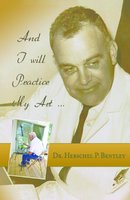
And I Will Practice My Art
Writerspace
Non-Fiction
January 15, 2013
ISBN-10: B00B4HGJFS
ISBN-13: B00B4HGJFS
Available in: e-Book
And I Will Practice My Art
by Herschel P. Bentley
This story begins 83 years ago with the birth of the author in northeast rural Mississippi during the time of the Great Depression. World War II forever upsets the idyllic life enjoyed by a young boy growing up in a small town without a care in the world. Suddenly, his carefree life is gone. However, the war does more than upset individuals’ lives. Inexorably, it begins to change the profession of medicine.
And I Will Practice My Art details the author’s journey through obtaining an M.D. degree and postdoctoral education to his work as one of the leaders in his field. Upon completing his postdoctoral fellowship and joining the faculty at the University of Alabama School of Medicine, Dr. Bentley was only the second pediatric hematology-oncology specialist in the entire south. He became the youngest chairman of pediatrics in the United States at the age of 33. His career successes led him deeper into medical research, requiring him to set aside his personal goal of practicing medicine in a small town. He would head the development of a top-ranked department of pediatrics, the administration of a university medical center, and the development of a new medical school before finally fulfilling his dream “to practice his art.”
Herschel P. Bentley's Bio
Dr. Herschel Bentley was born in Amory, Mississippi in 1928. Educated in public school systems in Amory, Mississipi and in Huntsville and Gadsden, Alabama. Accepted at School of Medicine, University of Alabama in 1950. He was one of 52 students taken out of about 2,500 applicants, the baby of the class. Dr. Bentley served his military obligation at Barksdale Air Force Base in Shreveport, Louisiana, practicing pediatrics for two years, he never made it into a single plane.
From the Air Force, Dr. Bentley went to the University of Minnesota to do a post-doctral fellowship in pediatric hematology-oncology. This was a pivotal time in his professional life with an daily exposure to world famous physicians and learned to seek a solution to unansweable questions by doing research. Finishing this, he returned to Alabama to be on the pediatrc faculty at Alabama. At that time Dr. Bentley was only the second pediatric hematology-oncologist in the Southern United States. Pediatric sub-specialists were rare in those days, to say the least. After a year, he became Head of the Department of Pediatrics at the tender age of 33. After 6 years, Dr. Bentley went to Little Rock, Arkansas as Professor of Pediatrics and Assistant Vice President for Health Affairs for two years. He returned to Alabama to get away from academic politics and to practice pediatrcs again. When the University of South Alabama created their medical school, Dr. Bentley joined as faculty but didn't want to give up his pediatic practice, so he did both. He did this until the school was functioning, then resigned and did only private practice until he retired at age 65.
According to Dr. Bentley,
“In pediatrc oncology, one cannot simply decide to retire and leave in short fashion, because one is obligated morally to follow a child with cancer until a cure is assured. In oncology, one gets very close to one's patients and their families. To retire before one is assured of the outcome would be patient abandonment in my way of thinking. I stopped taking new cancer patients when I was 60.”
To fill in the void this brought on he developed a new business, Bentley's Restoration and Reproductions. This was furniture only and was taught to him by his father throughout his youth. He very gentley restored antique furniture to its original beauty and likewise, built antique reproductions that were exact replicas of their predecessors in every way. The business was a success, with customers from coast to coast, building a reputation, not only of doing good work, but as only one of a very few who did this type of restoration. After retiring from medicine, Dr. Bentley did this full time and enjoyed every minute of it.
When Dr.Bentley got to the point where he could no longer physically do the work, he closed his restoration business, but he also realized that he had to find something useful to occupy his time. He decided to take up painting again. He did a lot of painting in his younger years but hadn't the time to do it. Dr. Bentley finds painting to be very enjoyable and something he can physically manage.
His wife, Betty, named his new career — The Third Venture.

